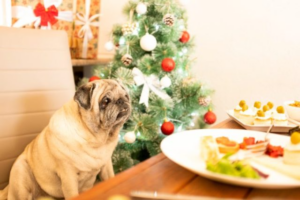
Christmas is the season of joy, family, and food. While it’s tempting to share your festive feast with your furry friends, not all foods are safe for dogs. In fact, some of the holiday foods we love can be toxic to them and cause serious health problems. Whether it’s a small bite of turkey or a sneak peek at the dessert table, there are many foods that should never end up in your dog’s bowl. To ensure your pup stays happy and healthy this Christmas, let’s dive into which holiday treats you should avoid feeding them!
Why Some Christmas Foods Are Dangerous for Dogs
Before we dive into the specific foods to avoid, it’s important to understand why certain foods can harm your dog. Dogs have different digestive systems from humans, and some ingredients that are perfectly safe for us can wreak havoc on their bodies. Chocolate, for example, contains theobromine, which is toxic to dogs. Foods that are rich in fat, sugar, or certain spices can also cause problems ranging from upset stomachs to serious conditions like pancreatitis or kidney failure.
1. Chocolate: A Holiday No-No for Your Dog
It’s hard to imagine Christmas without chocolate—whether it’s in your hot cocoa or sprinkled on your cookies. However, chocolate is highly toxic to dogs and can cause symptoms like vomiting, diarrhea, rapid heart rate, seizures, and even death in extreme cases. Dark chocolate, cocoa powder, and baking chocolate are the most dangerous, but even milk chocolate should be kept well out of reach.
What Makes Chocolate Toxic to Dogs?
Chocolate contains theobromine and caffeine, both of which are stimulants that dogs cannot metabolize effectively. The smaller the dog, the less chocolate it takes to cause a reaction, so even small amounts can be dangerous.
2. Grapes and Raisins: A Silent Threat
Grapes and raisins are a common holiday snack, but they pose a significant risk to your dog’s health. While the exact compound in grapes and raisins that causes toxicity remains unclear, ingestion can lead to kidney failure in dogs, even after just one or two pieces.
Symptoms of Grape or Raisin Poisoning
If your dog eats grapes or raisins, watch for signs such as vomiting, diarrhea, lethargy, or lack of appetite. In severe cases, the dog may show signs of kidney failure, which can be fatal if not treated immediately.
3. Onions and Garlic: Hidden Dangers in Holiday Dishes
Onions and garlic are staple ingredients in many holiday meals, but they’re a big no-no for dogs. Both can cause oxidative damage to a dog’s red blood cells, leading to a condition called hemolytic anemia. This can result in symptoms such as weakness, lethargy, and a decrease in appetite.
How Much Onion or Garlic is Harmful to Dogs?
Even small amounts of onion or garlic (whether raw, cooked, or powdered) can be harmful to your dog. The more they consume, the higher the risk of toxicity.
4. Alcohol: The Last Thing Your Dog Needs
If you’re celebrating the season with a festive drink, it’s important to remember that alcohol is highly toxic to dogs. Whether it’s wine, beer, or spirits, even a small amount can cause intoxication, resulting in vomiting, diarrhea, difficulty breathing, and potentially coma or death.
Why is Alcohol Dangerous for Dogs?
Dogs are much smaller than humans, and their liver and kidneys can’t process alcohol the way ours can. As a result, even a tiny amount can cause severe health problems. Always ensure that any alcohol-containing beverages are kept well out of your dog’s reach.
5. Cooked Bones: A Choking Hazard
While it might seem like a nice gesture to give your dog a bone from the Christmas ham or turkey, cooked bones are a huge safety hazard. They can splinter easily and cause choking, blockages, or even perforate your dog’s intestines.
What Should You Do Instead?
If you want to treat your dog with a bone, stick to specially designed dog bones or safe chews that won’t splinter. Always supervise your dog when they’re chewing to ensure their safety.

6. Xylitol: A Sweetener That’s Deadly for Dogs
Xylitol, a sugar substitute found in many sugar-free products, is incredibly toxic to dogs. It can cause a rapid insulin release, leading to hypoglycemia (low blood sugar), seizures, and liver failure. It’s often found in sugar-free gum, candy, baked goods, and even some peanut butter brands.
What Are the Symptoms of Xylitol Poisoning?
Signs of xylitol poisoning in dogs include vomiting, loss of coordination, lethargy, seizures, and even coma. If you suspect your dog has ingested something with xylitol, seek veterinary help immediately.
7. Fatty Foods: Not a Treat for Your Dog
Holiday meals are often rich in fats, such as those found in gravies, mashed potatoes with butter, and fatty meats. While fat is an essential part of a dog’s diet, too much of it can cause pancreatitis, a painful and potentially life-threatening condition.
What Are the Signs of Pancreatitis in Dogs?
Symptoms of pancreatitis include vomiting, abdominal pain, loss of appetite, diarrhea, and lethargy. If your dog shows any of these signs after indulging in fatty foods, contact your vet right away.
8. Raw Dough: A Rising Concern for Dogs
Many families enjoy baking Christmas cookies, but be cautious when it comes to raw dough. Yeast dough can expand in your dog’s stomach and cause bloating, pain, and even a life-threatening condition called gastric dilatation-volvulus (GDV), commonly known as bloat.
What Happens If a Dog Eats Raw Dough?
If your dog eats raw dough, the yeast inside can ferment and produce alcohol, leading to alcohol poisoning. The dough can also expand in the stomach, causing distress and requiring immediate medical attention.
9. Macadamia Nuts: A Holiday Snack to Avoid
Macadamia nuts are another holiday treat that should never be fed to dogs. Even a small amount can cause muscle tremors, weakness, fever, vomiting, and in some cases, paralysis.
Are All Nuts Dangerous for Dogs?
While macadamia nuts are the most harmful, other nuts like walnuts and almonds can also be problematic, particularly if they cause choking or digestive issues. Stick to dog-safe treats for your pup instead.
10. Dairy: Not Always a Safe Option for Dogs
Many dogs are lactose intolerant, meaning they have difficulty digesting dairy products. While a small piece of cheese or a dollop of whipped cream may not be immediately harmful, it can lead to stomach upset, diarrhea, or gas.
Why Can’t Dogs Digest Dairy?
Dogs lack the enzyme lactase, which is needed to break down lactose in dairy products. This can result in gastrointestinal distress, so it’s best to skip the cheese plate and choose other dog-friendly treats.
11. Spices: A Risk to Your Dog’s Stomach
Many holiday dishes are spiced with ingredients like nutmeg, cinnamon, and cloves. While small amounts of these spices might not hurt your dog, they can cause irritation or toxicity in large quantities.
Which Spices Should You Avoid?
Nutmeg and cloves, in particular, can cause vomiting, diarrhea, and other digestive issues in dogs. It’s always better to keep spiced dishes out of your dog’s reach.
12. Sweet Potatoes and Potatoes: To Feed or Not to Feed?
Sweet potatoes and regular potatoes are generally safe for dogs when cooked properly and in moderation. However, if they are served with butter, sugar, or other additives, they can quickly become unhealthy.
How Should You Prepare Potatoes for Dogs?
Always serve potatoes plain—without butter, salt, or seasoning. Avoid raw potatoes or potato skins, as they can be harmful to your dog’s digestive system.
13. Caffeine: Keep It Away from Your Dog
If you’re enjoying a hot cup of coffee or a holiday latte, make sure your dog doesn’t get into it. Caffeine is a stimulant that can cause restlessness, rapid breathing, heart palpitations, and even death if consumed in large quantities.
What Should You Do if Your Dog Consumes Caffeine?
If your dog ingests coffee, tea, or chocolate, contact your vet immediately. The effects can be severe, depending on the amount consumed.
14. Holiday Alcoholic Drinks: A Hidden Danger
Spiked eggnog and festive cocktails might be tempting to offer your guests, but never let your dog have a sip. Alcohol can cause alcohol poisoning, liver damage, and even coma in severe cases.
15. Pits and Seeds: Not Safe for Dogs
Avoid letting your dog near fruits like cherries, peaches, or plums. The pits or seeds in these fruits can cause choking, and many contain cyanide compounds, which are toxic to dogs.
